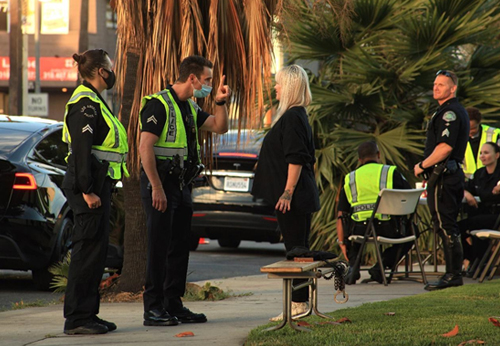Standardized Field Sobriety Tests In New Jersey
 In this article, you will learn…
In this article, you will learn…
- The three standardized sobriety field tests.
- Whether or not you should be read your Miranda rights.
- How your attorney can discredit the results of your field sobriety tests.
What Are The Standardized Field Sobriety Tests You Will Be Given During A DWI Investigation In Monmouth County And Elsewhere?
Police officers are not required to give field sobriety tests, but they do follow standard protocols promulgated by the National Highway Traffic Safety Administration. There are three such standardized field sobriety tests:
-
- Horizontal Gaze Nystagmus (HGN)
Police look for the involuntary jerking of the eyeballs. - Walk-and-Turn (W&T)
Police have you stand heel to toe with your arms at your sides while receiving instructions to walk out nine steps heel-to-toe on a real or imaginary line with your arms at your sides, turn around, and walk nine steps back. - One-Leg Stand (OLS)
Police have you stand on one leg with your hands at your side and hold that position for as long as you’re told.
- Horizontal Gaze Nystagmus (HGN)
If you don’t complete these tests perfectly, you are likely to be arrested for DWI.
Are Police Required To Read You Your Miranda Rights Before Asking You To Perform A Roadside Sobriety Test?
Police are not required to read you your Miranda rights before asking you to perform a road sobriety test in New Jersey. This is not consistent throughout the country, but field sobriety tests are not viewed as testimonial evidence in New Jersey.
The fifth amendment right to remain silent and to consult with an attorney only applies to testimonial evidence. Testimonial evidence consists of your answers to questions designed to elicit information. Answers to questions asking you to perform different tasks are not testimonial because these kinds of questions are directing you to do something rather than obtain information directly. Standardized field sobriety tests are intended to provoke physical manifestations of impairment or inability to do these tasks.
Officers are looking for signs of impairment and because they are trained to be suspicious and to think that everyone is guilty, they’re going to assume that any impairment they observe is a sign of drug or alcohol use. This is true even if the impairment may be due to much more innocuous things, such as being nervous, tired, distracted, or having some physical limitation like….
- You’re out of shape.
- You have an old injury.
- You have a chronic condition.
- You’re a klutz.
- A number of other very reasonable issues.
At this stage, however, all the officer is trying to establish is a reasonable suspicion to get you out of the car and probable cause to arrest you. All probable cause means is that the officer had a reasonable basis on which to continue his investigation by justifying an arrest for the purpose of having you submit breath samples. The burden on the State of proving probable cause is lot lower than it would be at trial. Probable cause is only a preliminary question. Judges tend to give cops the benefit of the doubt when it comes to this particular stage of the proceedings because society wants to encourage enforcement of its laws.
How Can My DWI Defense Attorney Discredit The Field Sobriety Test?
When we’re dealing with probable cause to arrest, the watchword is reasonableness. Among the things that officers are required to do, according to the standardized field sobriety testing manual, is to ask you if you have any physical problems that would affect your performance on the test. If you tell the officer that you have a physical problem and they give you the test despite that, we can attack the standardized field sobriety test even at the probable cause stage. It gives us a point at which to speak about how administering tests to you would be unreasonable, given that you told them of your physical issues.
You don’t want to have a one-legged man doing a walking heel-to-toe test. That’s unreasonable. Of course, the kinds of conditions people tell officers about are a lot less dramatic. If you had a muscle strain or an old injury and the officer was told as much, it can still be argued that it was unreasonable for the officer to demand these kinds of physical activities when, according to the manual, you’ve disclosed your limitations.
This might not matter much at the probable cause stage in practical terms, but it allows us to use a procedural device called a motion to suppress to challenge the reasonableness of what the officer has done, size up the officer to see how credible a witness he or she can be—i.e., how direct and honest they are or how evasive or deceptive their testimony may appear.
The motion to suppress can also be used to generate a transcript with which to potentially impeach the officer at trial. In other words, if the officer says something different at trial than he said at the preliminary hearing, those inconsistencies can be used to make his or her testimony at trial less believable.
With the guidance of a skilled attorney for DUI Law, you can have the peace of mind that comes with knowing that we’ll make it look easy. For more information on DUI Law in New Jersey, a free initial consultation is your next best step. Get the information and legal answers you are seeking by calling (732) 218-9090 today.

